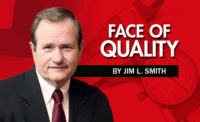Commitment and Discipline
Quality Requires a Team Effort

Quality doesn’t just happen. It doesn’t come as a result of just the corner office, but of countless people in the organization. Achievement of a robust quality culture is an outcome of the combined efforts of the minds and hearts of everyone working together toward a common cause.
A customer focus and a methodology to support improved customer satisfaction are not adequate, by themselves, to ensure an enhanced quality culture. Certainly, management must be committed to quality concepts and methodologies.
Involving the combined efforts of the organization into the pursuit of a common goal can be challenging. Many organizations find this effort to be a constant, ongoing struggle. There are usually roadblocks of many varieties.
In each organizational model of excellence, we are likely to find visionary and inspirational leadership, but that is coupled with a sustained quality environment throughout the organization. There will be pervasive evidence of a continuous commitment and disciplined pursuit of quality excellence.
I would like to emphasize the importance of commitment and discipline, and to illustrate their applicability to organizational success. Enlightened management must have a heightened sense of special individual attributes that it must possess, learn, develop, or hone to enhance their ability to lead.
A committed and disciplined organization begins with individual effort, and so too does it continue, sometimes through the pure willpower of those who understand the importance of achieving a substantive quality environment.
Regardless of the positions held by those in management, it’s a safe assumption that most positions have been in place for some time and they have, therefore, been inherited from someone else. Likely these positions have been held by numerous people over a span of many years. Policies, practices and standards are generally well-established. Everyone is part of an established organization which means many things are well defined, could be rigidly enforced and fully entrenched.
Therefore, implementing a true quality environment which might go ‘against the grain’ can be daunting, but it is subject to change. However, to do so takes courage and fortitude to be in pursuit of a quality movement. It takes sustained commitment and discipline, and these attributes come from within.
Change is never comfortable. It may have been Mark Twain who once said, ‘the only person who likes change is a baby with a wet diaper.’ As someone who has led or been part of many important transformations at a Fortune 50 company, I can say that change is unsettling. It can be rewarding, but it is also fraught with frustration and possibility of failure.
Change can be a risky business. Think of it as a force field analysis, developed by Kurt Lewin, a social psychologist. For every reason for change, there will certainly be one or more resistances present to push back. There always seem to be countless reasons for status quo and reasons not to move into the next level. It may be that it needs to be more painful to stay in current reality than it is to move into the future.
Change seems easiest when forced externally, when an organization must respond to the pressure to change. An example might be when a major customer insists that your organization have a quality management system registered by a reputable registrar (i.e. ISO9001). Failure to achieve that customer request could mean a loss of business and negative impact on the financial health of the organization. So everyone gets onboard very quickly and is willing to help.
However, being an internal change agent for an enhanced quality environment is very different. It exposes one to uncertainty, to untried ways to function or operate. It requires change agents to sometimes say, “I don’t have the answer at this moment, but we’ll find the way.”
Quality cannot be implemented single-handedly. It requires a team effort, beginning at the top, but mobilizing everyone. Every person is a stone of the organizations’ foundation.
To be a change advocate is to break from the past and maybe from organizational tradition. It requires an inner strength. It requires commitment and discipline.
Quality professionals have a great track record as change agents because they have the attributes to enable change within an organization. They are well positioned and generally have management’s attention in a lot of critical areas. If you are in this position, are you ready to step forward? More on this important topic coming next month.
Looking for a reprint of this article?
From high-res PDFs to custom plaques, order your copy today!







